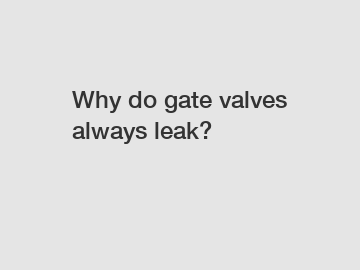Why do gate valves always leak?
Why do gate valves always leak?
Gate valves are a widely used type of valve in various industries, including oil and gas, water supply, and sewage systems. However, one recurring issue that many encounter with gate valves is leakage. Despite their function of regulating and controlling the flow of fluids, gate valves can sometimes fail to seal properly, resulting in leaks. This raises a fundamental question: why do gate valves always leak? In this article, we will delve into this issue and explore possible reasons behind gate valve leakage.
1. Design and Construction:

One significant factor that contributes to gate valve leakage is the design and construction of the valve itself. Gate valves consist of a gate or disc, a body, and a bonnet. The gate is designed to move up and down to control the flow of fluid. However, due to the necessary clearances between the gate and the body, it may allow for some leakage when the valve is closed.
2. Improper Installation:
Improper installation is another common reason for gate valve leakage. During installation, it is imperative to ensure that the valve is correctly aligned and that the bonnet bolts are tightened adequately. Failure to do so may create gaps or misalignments, allowing fluid to seep through.
3. Lack of Maintenance:
Regular maintenance is crucial for gate valves to prevent leaks. Over time, valve components may wear out or become damaged, leading to malfunctions. By implementing an effective maintenance schedule, including inspections, lubrication, and part replacements when necessary, operators can minimize the risk of leaks in gate valves.
4. Corrosion and Erosion:
The presence of corrosive fluids can gradually erode the internal components of gate valves, leading to leaks. Similarly, erosion caused by high-velocity fluid flows can weaken the valve materials, compromising their sealing capabilities. It is essential to consider the resistance of the valve materials against corrosion and erosion when selecting gate valves for specific applications.
5. Pressure and Temperature Extremes:
Gate valves that operate under extreme pressure and temperature conditions can be more prone to leakage. Rapid temperature changes or excessive pressure can cause expansion, contraction, or deformation of valve components, leading to sealing problems. Choosing gate valves with appropriate pressure and temperature ratings can help mitigate this issue.
6. Galling and Scoring:
Galling, which refers to the adhesion and tearing of metal surfaces, and scoring, which involves the scratching of valve components, can result in leaks. These issues often arise due to insufficient lubrication or the use of inappropriate lubricants. Applying suitable lubrication and ensuring compatibility with the valve materials can help prevent galling and scoring.
7. Insufficient Gasket Sealing:
Another possible cause of gate valve leakage is ineffective gasket sealing. Gaskets play a crucial role in providing a seal between valve components. If the gasket is worn out, damaged, or improperly installed, it can lead to leaks. Regular inspection and replacement of gaskets, as part of maintenance procedures, are essential to maintain effective sealing.
In conclusion, while gate valves are widely used for their reliable flow control capabilities, they can still experience leakage issues. Factors such as design and construction, improper installation, lack of maintenance, corrosion and erosion, pressure and temperature extremes, galling and scoring, as well as insufficient gasket sealing, all contribute to gate valve leakage. It is crucial for operators and maintenance personnel to be aware of these factors and take appropriate measures, such as regular inspection, proper installation, and adequate lubrication, to prevent leaks and maintain the efficient functioning of gate valves. By addressing these underlying reasons, we can significantly reduce the occurrence of gate valve leaks and ensure optimal performance in various industrial applications.
Are you interested in learning more about choke and kill manifold, surface valve, what is ssv valve? Contact us today to secure an expert consultation!

Comments
0